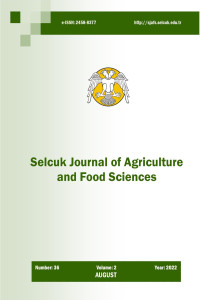Öz
Salt accumulation within the root zone significantly effects plant growth and development in arid and semi-arid regions. Today, use of low-quality irrigation water in agricultural production is increasing rapidly, because of continuous depletion and pollution of water resources. This means more salt transferred to the soil profile. It is of great importance to predetermine the effects of irrigation practices for sustainable crop production. For this purpose, models and tools that can produce reliable and fast results should be used. In this study, soil profile salinity was modeled with the HYDRUS-1D software. In present study, Three different irrigation water salinity levels (S1=0.25 – control/municipal tap water, S2=1.5, S3=3.0 dS m-1) and 4 different irrigation volumes (leaching ratio) (LR1=10%, LR2= 20%, LR3=35%, LR4=50%) were modeled in a randomized plots factorial experimental design with 3 replications. Each treatment was carried out in individual PVC lysimeters with a length of 115 cm and a diameter of 40 cm in open-field to determine the efficiency of the model at different salinity levels and leaching rates. Alfalfa (Medicago sativa L.) was preferred as a plant due to its economic value, effective root depth and being a perennial plant. During the growing period, a total of 7 irrigations were practiced and five soil samples were taken from 20, 40, 60, 80 and 100 cm depths at the last day of each month. Present findings revealed that values modeled with the HYDRUS-1D software were sufficient to determine the soil profile salinity. Relative error values (RE) ranged from 0.048 to 0.307. Increase in salinity and irrigation applications reduced the accuracy of the model. However, it can be said that the values produced by the model were sufficient even under the mentioned conditions. Especially for academic studies, the HYDRUS-1D software can be used to obtain fast and reliable results.
Ayrıntılar
| Birincil Dil | İngilizce |
|---|---|
| Konular | Ziraat Mühendisliği (Diğer) |
| Bölüm | Araştırma Makalesi |
| Yazarlar | |
| Yayımlanma Tarihi | 25 Ağustos 2022 |
| Gönderilme Tarihi | 7 Haziran 2022 |
| Yayımlandığı Sayı | Yıl 2022 Cilt: 36 Sayı: 2 |
Selcuk Journal of Agriculture and Food Sciences Creative Commons Atıf-GayriTicari 4.0 Uluslararası Lisansı (CC BY NC) ile lisanslanmıştır.


